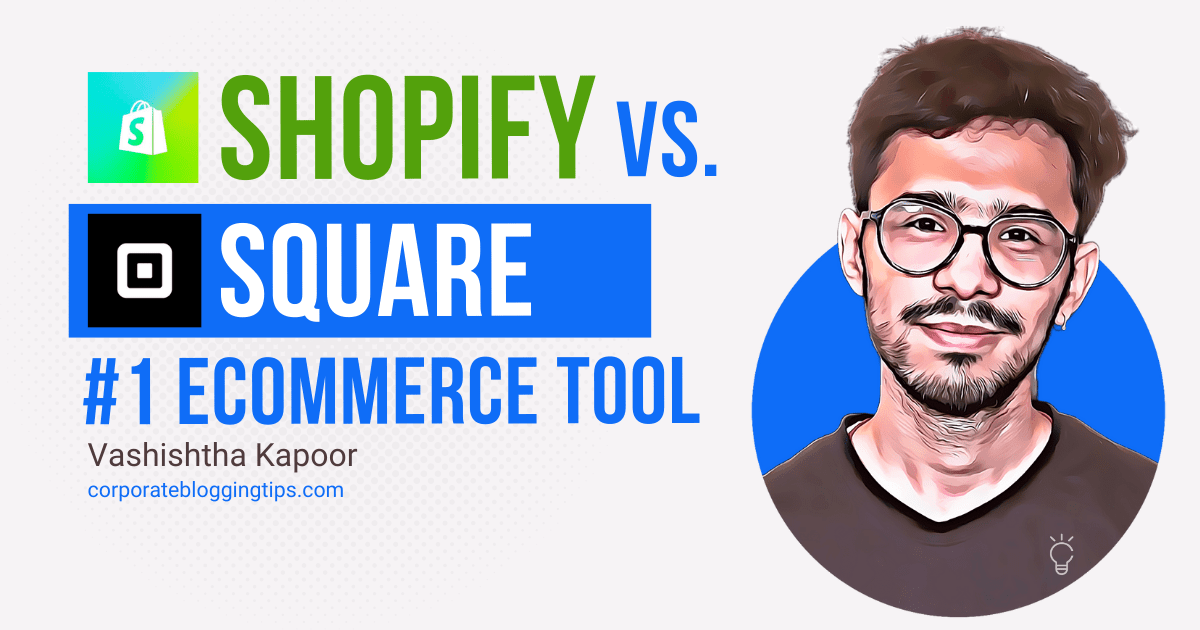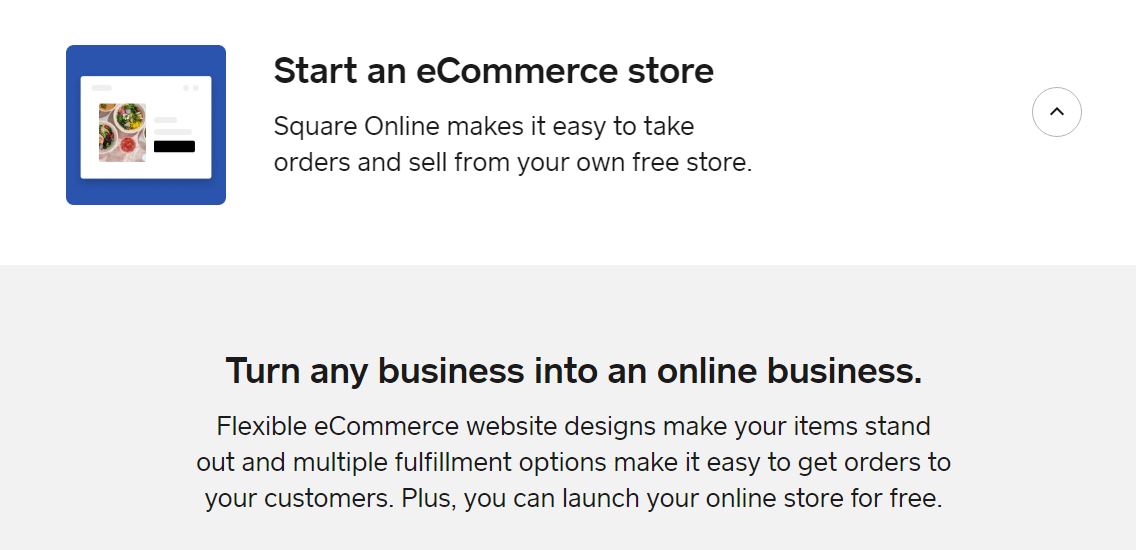
When it comes to talking about an eCommerce platform, Shopify and Square both have a great brand reputation in the industry. Not just for the online selling solution, but also for the offline selling option – POS (point-of-sale) solution.
While there are many factors that influence your decision to choose either of them. I took the price, ease of use, features, and flexibility into consideration and prepared this head-to-head comparison of Shopify vs. Square.
Shopify vs Square: Overview
| Details | Shopify | Square |
| Price (eCommerce) | $9 per month | Free |
| About | As an eCommerce solution, Shopify started out in 2006 with a humble beginning. Over the years, the company has grown immensely and even managed to develop comprehensive point-of-sale software. Today, Shopify offers a fully integrated suite of commerce tools to entrepreneurs who wish to do business online, in-store, and on the go. | Contrary to that, Square was introduced in 2009 as a POS system. Through the smartphone and a free card reader, it was subsequently the first solution to widely offer card processing. Square is more than a mobile POS system at the moment. The company’s platform now facilitates merchants who are expanding their businesses. |
| Transaction fee | 2.9% + $0.30 | 2.9% + 30¢ |
| POS Subscription | $89/month | 2.6% + 10¢ (Per tap, dip, or swipe) |
| Started in | 2006 | 2009 |
| POS Hardware | Starts at $39 in the United States | $0 Hardware with free reader |
| Best Used for | Managing an eCommerce store online | Online and in-store payments |
| The USP | Handle unlimited traffic, orders, and Inventory | Handle POS payments seamlessly |
| eCommerce Plugins | Massive repository of free and paid add-ons | Limited add-ons for more features |
| Store Designs | Find a Shopify theme online and install it on the store | Limited designs are available on the repository. |
Shopify vs Square: eCommerce Feature
Come on, let’s be honest. Due to the differences in approaches, it is hard to compare their eCommerce features directly. In contrast to one of the solutions, Square is more of a payment processor.
| Shopify | Square |
 |  |
| Online Store – Includes eCommerce website and blog Unlimited products in all plans Staff members with access to the Shopify admin and Shopify POS 24/7 support Sell on online marketplaces and social media. Channel availability varies by country Assign inventory to stores, warehouses, pop-ups, or wherever you store products. Manual order creation Discount codes Free SSL certificate Abandoned cart recovery Third-party calculated shipping rates Filter and group customers into hundreds of segments Send automated emails with templated or custom workflows Unlimited contacts in the email list | Free website with SEO tools Pickup, delivery & shipping Sell on Instagram & Facebook Accept Afterpay Self-serve ordering Sync with Square POS Custom domain No Square ads Free domain for 1 year Custom font uploads Password-protected pages Accept PayPal Abandoned cart Advanced Reporting Product reviews Gifting Options |
| Shopify is a jack of all trades, but eCommerce has always been its primary focus. The company began its business with this product, then added other products to its business suite. | Startups should take advantage of Square’s offer to host their stores on its domain. For your online store, you may still choose to source an independent one. |
| Winner 🏆 | 😇Good for Payment processing |
Verdict:
If I take ease-of-use into consideration, Shopify is the winner 🏆 because it has all the features and that too are very easy to use.
POS System
Indeed the main point of contention. Even though both Square and Shopify come with robust POS software, the two firms remain competitive in this area.
How does each of them perform individually?
| Shopify | Square 🏆 |
 |  |
| – Fast Payments – Smooth payments with POS hardware – Single-store, multi-store, and events – International standard hardware | – Best for small businesses – Use for retail, restaurants, appointments, and more – The first reader is free to start with – Smart Invoicing and virtual terminal |
Verdict
In the battle between these two, point of sale makes a much more incredible showdown than eCommerce.
That said, it’s interesting to note that many of these features apply to both Shopify POS and Square POS. In terms of compatibility, for instance, both Shopify and Square have produced iPad and Android versions for smartphones and tablets – although the iPad app is clearly preferable.
Shopify POS and Square POS both offer powerful inventory management tools that enable you to track and sync inventory in real time across all of your stores. Regarding payments, both of them support a variety of payment options, split tenders, and tax calculations. However, Shopify’s custom payment options give it a competitive edge in this area.
However, Square makes a comeback with offline transactions as well. It may be possible to process credit cards with Shopify, but it does not. In contrast, Square facilitates even credit card payments during outages.
Overall, we would say both are highly effective at driving in-store sales. Square has more POS features than Shopify, even though Shopify is better at customization.
Shopify vs Square: Pricing
Shopify Pricing Plans
| Plan | Price | Features | Transaction fees |
| Shopify Lite | $9/month | Sell on Facebook and a third-party website | 2.7% + $0.00 for in-person credit card swipes, 2.9% + $0.30 for online payments |
| Shopify Basic | $29/month | Website with a blog and an e-commerce store, free shipping certificates, discount codes, manual order creation, fraud assessment, 24/7 customer support, unlimited file storage, no limit on the number of items, 2 staff accounts | 2.7% + $0.00 for in-person credit card swipes, 2.9% + $0.30 for online payments |
| Shopify | $79/month | Shopify Basic features, abandoned cart recovery, professional reports, gift cards, 5 staff accounts | 2.5% + $0.00 for in-person credit card swipes, 2.6% + $0.30 for online payments |
| Shopify Advanced | $299/month | All of Shopify’s features, real-time carrier shipping, advanced reporting, 15 staff accounts | 2.4% + $0.00 for in-person credit card swipes, 2.4% + $0.30 for online payments |
Square Pricing Structure
| Payment Type | Fee |
|---|---|
| Online payments for eCommerce | 2.9% + $0.30 |
| Keyed-in card transactions | 3.5% + $0.15 |
| In-person swipes, inserts, and taps of cards | 2.7% |
Payment Processor Fee
| Payment Method | Square Register | Square For Retail |
| In-person swipes, insertions, and taps | 2.5% + $0.10 | 2.5% + $0.10 |
Verdict
Shopify and Square charge nearly identical transaction fees for online and in-person card payments. Shopify’s additional monthly charges are significantly more expensive than other options.
Shopify is more suitable for merchants who prioritize their online sales, while offline stores only supplement it.
In contrast, Square is ideally suited to merchants more focused on offline sales, while eCommerce websites serve as auxiliary stores.
Main Differences Between Shopify vs Square
Shopify and Square differ in the following ways:
- In addition to Shopify’s monthly fee, Square also charges a processing fee, while Shopify is free to use
- As an online POS system, Shopify is distinct from Square as an offline-online hybrid
- With Shopify, you have access to thousands of third-party apps, while Square offers a smaller selection of tightly controlled integrations.
Why does Shopify Win?
eCommerce platforms abound. Only one can catapult your growth through a true NETWORK effect. Many developers build apps for Shopify, and their ecosystem of integrations is robust. We cannot ignore this.
Also Read:
- Best Shopify Dropshipping Themes
- 15+ Best Shopify Themes For Large Inventory: Find The Right One For Your Business
Final Verdict: Who’s the winner between Shopify vs Square?
What’s better, Square or Shopify?
The best choice depends on your type of business and what works best for your model. One thing I can say for sure is that both have their own unique e-commerce benefits and features.
❤️Due to its extensive flexibility and deep pool of apps and talent (Shopify experts) for customer support, Shopify, on the other hand, is the ideal solution for the dynamic eCommerce seller or digital merchant.
